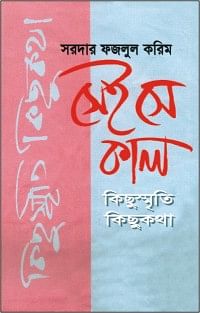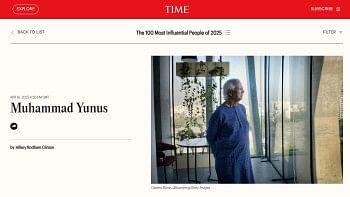The life of a man of commitment

Shei Shey Kaal
Kichhu Smriti Kichhu Kotha
Sardar Fazlul Karim
Papyrus
Sardar Fazlul Karim is one of our most revered icons. He has been one of Dhaka University's finest products but a product with a difference. Born in 1925 in Barisal of lower middle class parents, this outstanding student and teacher has been a simple, humble and wise person all his life, dreaming of a state for the people and by the people and facing great suffering with ease and no complaint. Can we imagine that he spent almost the full Pakistan period in jail, this soft-spoken, frail, little man of high ideals? No wonder a library assistant of the Dhaka University had remarked that he was a 'dangerous' man, leaving his lecturer's job at twenty four and returning to the university in 1972, only after Pakistan broke up. It may be remembered that Bangabandhu Sheikh Mujibur Rahman and national professor Abdur Razzak brought him back to Dhaka University immediately after independence while Ayub Khan and Monem Khan had ensured that he could never return to his teaching job during the Pakistan period.
As one goes through these memoirs, one salutes him and his contemporaries for the great suffering they went through while struggling for the rights of the common man. They were the second generation of enlightened middle class young men of progressive thoughts coming out of Dhaka University. Sardar Fazlul Karim describes himself as a 'non-ambitious observer of life'. His memoirs are a bright and unforgettable account of the life lived by his generation.
Professor Karim stood second at the HSC examination. He came first in the first class in both his BA Honours and MA examinations in philosophy from Dhaka University. He became a lecturer in 1946 at the age of twenty-one. Involved in progressive politics as a student, he was an 'enemy' of the Paksitan government and in four phases spent almost the full twenty-four years of Pakistani rule in jail. He participated in the 58-day hunger strike of political prisoners demanding human treatment. He was elected a member of the Pakistan constituent assembly while in prison.
Sardar Fazlul Karim has written scholarly original books on philosophy, the best among them being his 'Darshankosh'. He has translated Plato, Aristotle, Rousseau and Engels for the benefit of Bangladeshi students, teachers and general readers. His memoirs are dedicated to 'Deathless Nazma'. He is referring to Prof. Nazma Jesmin Choudhury, wife of Prof. Serajul Islam Choudhury. She died of cancer in 1989 and was like a younger sister to him. The memoirs are in fact based on lectures arranged in her memory by the Modern Languages Institute of Dhaka University.
Sardar Fazlul Karim is always humble. At the beginning of his book he declares himself ordinary, weak, unfit and poor. He also declares that although people live in death he does not recognise death. He likes the concept of a martyr, a 'shaheed'. A shaheed is one who sacrifices his or her life in the struggle to create the human society of our dreams. Prof. Nazma Jesmin Choudhury was such a shaheed. He once raised full-throated slogans in favour of a people's revolution. What happened to the revolution? Has it come? He feels that it has come. We are living in a revolution. We should not despair, we should not be afraid of the devilish power of the enemy. Our strength lies in the fighting tradition of the oppressed people. We are heirs to a great tradition of struggle.
Saratchandra Chatterjee's Pather Dabi inspired him to dream of a revolution for the first time. He was in high school then. His friend Mozammel Haq had given him the book. Young Mozammel, a political activist then, died in the Cairo plane crash of 1965, when he was a famed journalist. The book greatly influenced the teenaged Sardar. Years later he learnt that the same book had inspired Jyoti Basu to be a revolutionary. Sardar Fazlul Karim was always an obedient child and even helped his father in agricultural work. He prayed a lot as a boy and even sounded the 'azan', the call to prayer. His parents were illiterate and very simple. They were not supposed to send him to school. That they did so makes him feel grateful to them. His school teachers were committed, hard-working people. One of them, Lehaj Uddin Ahmed, was physically handicapped. He fought a great battle to live an honest life. This inspired the young Sardar a lot.
Sardar Fazlul Karim came to Dhaka to study IA. He entered the Govt. Intermediate College. Progressive students looked him up. They also zeroed in on Syed Nuruddin and Sanaul Huq. Sardar was more a nationalist than a communist then. He brought out wallpapers and had a good personal library. Friends borrowed books from him. Pearl Buck's The Good Earth also influenced him. His favourite teacher P.C. Chakrabortty was killed in a communal riot. Riots meant a few incidents of stabbing, quite a common occurrence in Dhaka at the time.
Sardar Fazlul Karim became a DU student in 1942. Why Dhaka and not Calcutta? Because Dhaka would be cheaper and his elder brother was known to many teachers. He studied English for a few days but shifted to philosophy because Haridas Bhattacharya's class lectures had attracted him. He would attend classes of other departments too. He passed his Honours in 1945 when the Second World War ended. TH Khan and Akhter Imam were Sardar's classmates. The 1943 famine influenced him a lot. The communists were very active during the Bengal famine. PC Joshi wrote a touching book, 'Who lives if Bengal dies?' Sardar left Socrates, Plato and Hegel in his room and travelled to remote villages with relief for the hungry.
Abdul Hashim led a communist group within the Muslim League. Sardar and his friends supported him in Dhaka. Munier Chowdhury also joined Sardar's group. Chowdhury taught English at DU then. He had a great sense of humour. He was a master speaker, a master debater. He had a bicycle. Chowdhury and Sardar were great friends and influenced each other deeply. Sardar nicknamed him 'King of Words'. Tajuddin Ahmed, Mohammad Toaha and Abdul Matin were dear friends of the Sardar. Pragati Lekhak Sangha was established in Dhaka in 1938. Sardar wrote on Somen Chanda in one of the issues. He also translated Russian stories.
Sardar Fazlul Karim was not at all ambitious. He refused to go to London on a scholarship for the sake of his party. He became a lecturer in 1946. Pakistan came into being in 1947. Many brilliant teachers of Dhaka University left for India. Sardar left his teaching job in 1949 at the instruction of his party. His colleagues were shocked. Police went looking for him and his party advised him to go underground.
Sardar Fazlul Karim participated in the 1952 language movement. He attended both the meetings of Mohammad Ali Jinnah, whose comments angered the Dhaka students beyond measure. He describes his underground days and his long periods in jail in detail. He was a legend among communists even as a young man. He was first arrested in 1949. He was in jail till 1955. Nobody seriously wanted to know how he had spent his days in confinement, in 12 feet by 8 feet rooms, sometimes under lock and key. He participated in the hunger strike of December 1949. All facilities given to political prisoners by the British government had been withdrawn by the Pakistan government. The prisoners wanted more humane treatment. They were kept in jail without trial for as long as the government wanted. Sardar entered Dhaka jail on the twentieth day of the hunger strike, when the jail authorities' inhuman treatment killed labour leader Shiben Roy. He joined the hunger strike immediately.
Sardar Fazlul Karim was released in 1955 by the United Front government. When he became an MCA, he noticed in the Karachi MP hostel that Pakistani politics started after midnight. He never attended such conspiratorial midnight meetings. Syed Azizul Huq alias Nanna Miah gave him a good compliment. 'Sardar, you are a dangerous person. While we run after power, power runs after you.' Pathans would call him 'The Sardar of the East', hinting at his little size. A few Pathans would say, 'He has wisdom.' Sardar spoke against the cessation of provincial autonomy in Pakistan. His election as a member of the assembly stirred both the wings of Pakistan. However, Washington didn't like a communist MCA. So they saw to it that he was again arrested during Ayub's martial law, this time from a plane which also carried Bangabandhu Sheikh Mujib. In 1962 he was released under certain conditions.
In 1963 Sardar joined the translation section of the Bangla Academy. Communist-friendly Abu Zafar Shamsuddin was his colleague. From 1969 to September 7, 1971 he was in charge of the cultural section. On the latter date he was arrested by the Pakistan army. Earlier he had observed the mass upsurge of 1969 and the release of Bangabandhu from jail. 1971 stirred his soul. He attended office in 1971 only to save his family. Office meant talking about our liberation war and listening to Swadhin Bangla Betar Kendra. Freedom fighters set him free on December 17, 1971.
Sadar Fazlul Karim takes things easy. He can take all suffering in his stride. He can analyse difficult social changes with ease for his readers. In this work, he converses with readers. But he should have penned a more extensive autobiography for our sake, telling us about his difficult but beautiful journey 'spreading humanity and knowledge'. One salutes the little man's courage and sacrifice once again. He has shown us only the tip of the glacier, that is, his life. A fuller autobiography would be in order.
Junaidul Haque writes fiction and is in the travel business.

 For all latest news, follow The Daily Star's Google News channel.
For all latest news, follow The Daily Star's Google News channel. 



Comments